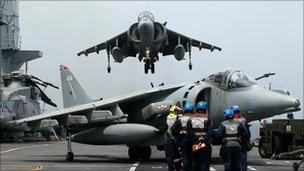Admirals urge rethink on Harrier and Ark Royal cuts
- Published

The admirals say the Harrier is more versatile and will be cheaper to maintain than the Tornado.
A group of former Royal Navy admirals has called for the decision to scrap the aircraft carrier Ark Royal and the fleet of Harrier jets to be reversed.
In a letter to the Times the group says defence cuts will leave the "newly valuable" Falkland Islands open to attack and calls the plan to axe the Harrier fleet "financially perverse".
But ministers insist the UK will still be able to defend the Falklands.
And the Falklands government said it was "satisfied" with its protection.
BBC defence correspondent Jonathan Beale said the strongly worded letter from a group which includes two former heads of the Royal Navy - Lord West and Sir Julian Oswald - confirmed the deep anger felt in the navy over the cuts announced in the government's Spending Review.
The letter is also signed by Vice-Admiral Sir Jeremy Blackham, Vice-Admiral John Mcanally and Maj Gen Julian Thompson.
'National humiliation'
The admirals warn the decision to scrap the Harrier force and aircraft carrier HMS Ark Royal, and to rely entirely upon Tornados, will leave the Falklands open to attack.
They write: "In respect of the newly valuable Falklands and their oilfields, because of these and other cuts, for the next 10 years at least, Argentina is practically invited to attempt to inflict on us a national humiliation on the scale of the loss of Singapore.
Lord West, who served as security minister under former prime minister Gordon Brown, told BBC Radio 4's Today programme: "If the islands were captured we have absolutely no way whatsoever of recovering them unless we have carrier air."
But Armed Forces Minister Nick Harvey insisted that the Falklands could still be protected - and if necessary, retaken - without an aircraft carrier.
"The Falklands is a very different situation now from what it was in 1982. We're far more alert to the threat now, we've got a well-defended airfield, we've got a company of troops there, we've got submarines," he told the BBC.
"You can launch fighter jets from the land. We have basing rights, we have overflight rights. Carrier strike is just one way of launching a fighter jet, it's not the only way."
In a statement, the government of the Falkland Islands said it was "satisfied by, and grateful for, the level of defence on the islands which the British government has assured us is suitable to maintain an effective deterrent".
The admirals say the prime minister was badly advised over the decision to scrap the Harrier force because it is more versatile and will be cheaper to maintain.
The letter says: "The existing Tornado force will cost, over 10 years, seven times as much to keep in service as Harrier. Was the recent exercise not supposed to save money?
"The decision to axe the entire Harrier force is strategically and financially perverse."
'10-year rule'
But Mr Harvey insisted that the Tornado was the right aircraft for the current conflict in Afghanistan and for the next decade or so.
"This was a very difficult decision. It was looked at in immense detail. In the end a decision had to be made and we took the decision on the basis of the balance of military advice coming from the current military leadership.
"When you look at the full range of threats we might face over the next 10 years we get far more capability out of the Tornado than we would out of the Harrier."
The cuts mean no planes will be able to fly from British aircraft carriers until 2019.
On this capability gap, the admirals wrote: "The government has, in effect, declared a new '10-year rule' that assumes Britain will have warning time to rebuild to face a threat.
"The last Treasury-driven '10-year rule' in the 1930s nearly cost us our freedom, faced with Hitler."
- Published18 October 2010
- Published19 October 2010
- Published18 October 2010